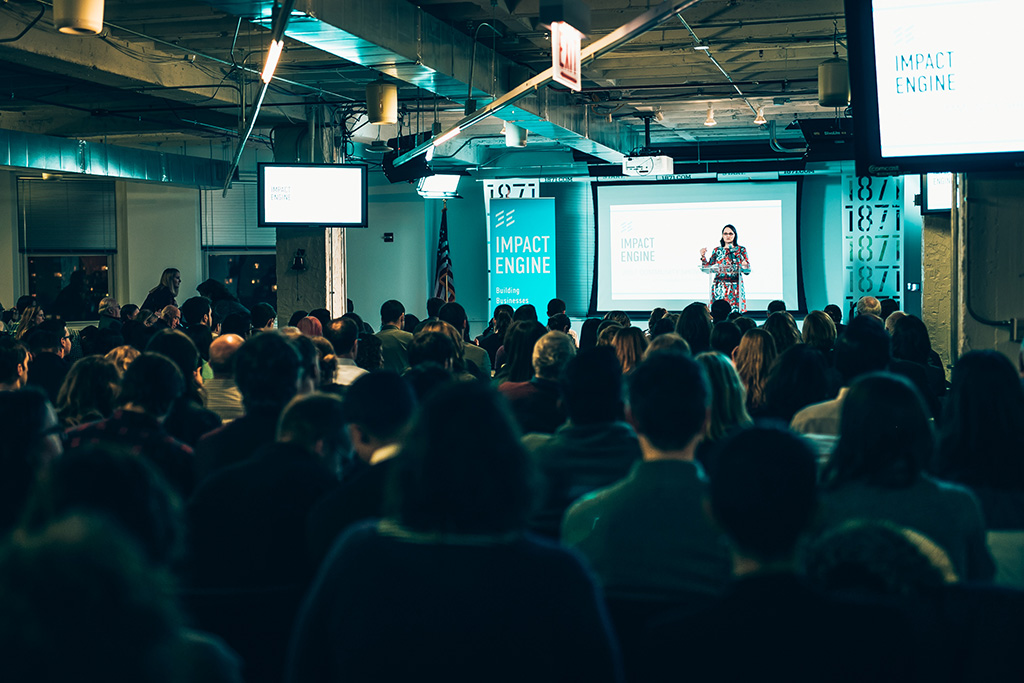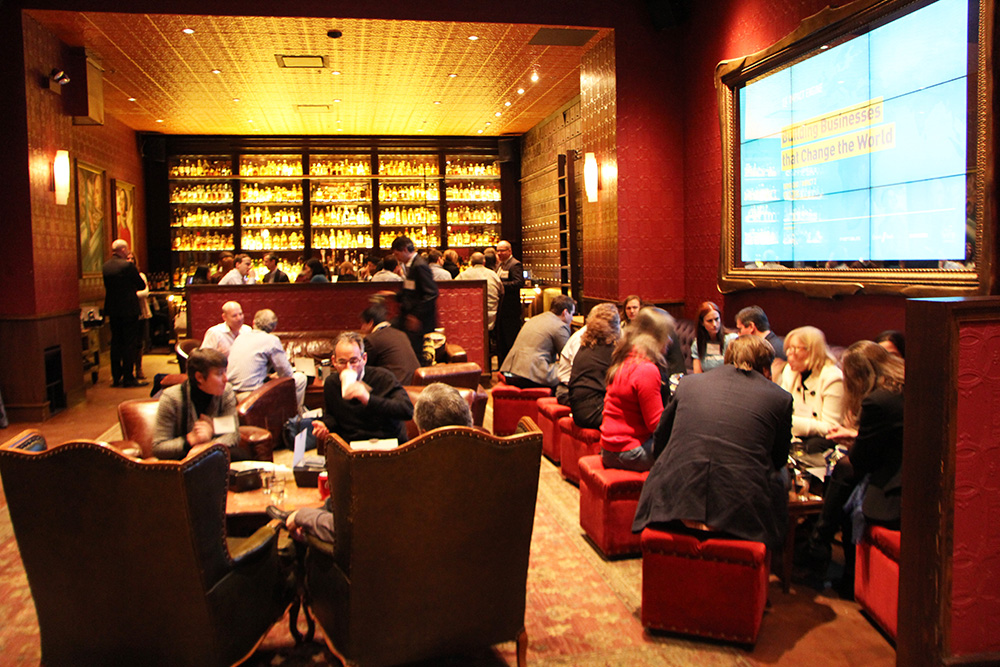From early conversations in 2011 to the deployment of our $10 million impact fund today, Impact Engine has grown and evolved in parallel with the companies in our portfolio driving innovation and impact. Today, we operate as a venture fund that invests financial and human capital in early-stage, for-profit technology businesses improving education, health, economic empowerment and resource efficiency. Our fund is backed by a group of engaged, like-minded impact investors who support our expanding portfolio of impact companies. Our strength is in our dedicated, supportive and engaged community of impact entrepreneurs and impact investors in Chicago. We’ve shared our journey here in the hopes that other communities may learn from our path.
At Impact Engine, we have worked over the past several years to build a market for impact investing around these two firm beliefs: (1) there are many talented entrepreneurs using for-profit business models to tackle social and environmental challenges that are also large, profitable market opportunities, and (2) there are a growing number of individuals that are realizing the power of their investment dollars and seeking to direct that power toward positive social and environmental outcomes at scale. We have approached this journey with a learning mindset, an openness to change, and a lot of scrappiness.
Our founders, Linda Darragh, then Director of Entrepreneurship at the University of Chicago's Booth School of Business, and Jamie Jones, who was leading the social entrepreneurship program at Northwestern University’s Kellogg School of Management, saw a need in the market and stepped up to fill it. Through their work with MBA students, Darragh and Jones observed that students looking to launch businesses with impact were often deterred by the lack of access to capital and mentorship. They also knew angel investors who were interested in the concept of impact investing, but didn’t see any investable opportunities. In 2011, the two decided to bring together investors, entrepreneurs and philanthropists throughout Chicago for a series of conversations, asking the question, “What can we do to fill the gap in impact investing in Chicago?” The answer was a twelve-week startup accelerator program called Impact Engine.
In retrospect, an accelerator was an ideal starting point. Unlike other groups who were “all talk” about impact investing, the Impact Engine accelerator involved real entrepreneurs, real investors, and real investments. Yet, it was a manageable size to test interest in the community. It was also perfect for entrepreneurs looking to get started on the right path, since critical early-stage financial and human capital can make all the difference in the very early stages of a company and Chicago did not have a lot of early-stage resources at that time.
Launching an accelerator was no small undertaking. First, Darragh and Jones had to find the right leadership. Luckily, they found and convinced Chuck Templeton, founder of OpenTable and successful Chicago-based angel investor, to take the lead as Impact Engine’s first Managing Director. Templeton’s talent as an investor and mentor, combined with his reputation in the Chicago community, made him the ideal leader to pull together the entrepreneurs, mentors, investors and volunteers that it takes to run a successful accelerator. With the addition of board members Tasha Seitz, General Partner at JK&B Capital, and Dennis Barsema, serial entrepreneur and instructor at Northern Illinois University College of Business, the accelerator was ready to launch.
Attendees at our Demo Day event, January 17, 2014.
After successfully raising the first fund of $525,000 from 22 local, individual investors to test the concept for the first cohort, the team put out the call for applications in May 2012. The accelerator was modeled after Excelerate Labs, a successful Chicago-based accelerator program focused on technology startups. Each company selected would receive $25,000 in seed funding, as well as mentorship, training, legal advice, tax consulting, marketing, sales strategies and a workspace at 1871, the largest tech hub in Chicago, for twelve weeks. In exchange, Impact Engine received a seven percent stake in each company. Eight companies were selected and completed the rigorous three-month program, and in December 2012, they presented at our first Demo Day to a crowd of more than 300 outside investors and community supporters.
The first accelerator was a major success: companies got connected to additional support in the form of customers, partners, investors and mentors, and investors were introduced to companies with potential to make a profit while also making a positive social or environmental impact. Finally, investors were opening their eyes to new investment possibilities. A local market for impact investing was born and ready to grow.
Over the next two years, we repeated and improved upon the accelerator model, running two more funds as accelerator cohorts in 2013 and 2014. By the end of the third year, we had invested in 23 companies that were employing 180 people and had raised $54.3 million in capital on top of our accelerator investments. Early success stories from our first class included ThinkCERCA and Piece & Co. ThinkCERCA, a web-based platform that gives teachers the tools to create and deliver personalized critical thinking instruction, is now serving over 310,000 students in 210 schools and helping improve critical reading skills by 1.5 to 2.5 grade levels each year. Piece & Co. is a marketplace that connects retail brands with artisans in the developing world. They have worked with notable brands like Nike, Tory Burch, Nordstrom and Banana Republic and have provided $640,000 to artisans in sixteen countries in the developing world. On the other side of the market, Impact Engine had engaged hundreds of mentors providing human capital to the companies, and more than 85 individuals became involved financially, making at least one investment in Impact Engine or its companies. It was clear that the market for impact investing in Chicago was thriving and had more potential.
As we began to grow and change, so did our team. Templeton stepped down as Managing Director in 2014 and joined Darragh and Jones on the Investment Committee. In his place, Jessica Droste Yagan and Tasha Seitz stepped in to tackle the question of how to evolve Impact Engine to meet the growing demand from investors and entrepreneurs, and it was decided that the next step was to become a seed-stage impact venture fund.

Jessica Droste Yagan, CEO of Impact Engine, speaks to a crowd of people at our Portfolio Showcase event at 1871 on January 31, 2017.
The decision to shift from accelerator to seed fund was driven by two factors. First, while there were a growing number of accredited investors interested in aligning profit and social return, early-stage investing requires a knowledge base and time commitment that many lacked, so entrepreneurs struggled to get checks written. Second, support systems for startup entrepreneurs were proliferating in Chicago and Impact Engine’s advantage was in its network of mentors and investors and its focus on impact, not in its accelerator curriculum. We thought more capital could be engaged and entrepreneurs more effectively supported if we took an active role and moved the capital on behalf of our investors through a fund structure. In 2015, we began raising a seed fund from individual investors, selling not only a stake in the fund, but also access to a strong community of Chicago-based investors who were on a similar impact investing journey.
In June 2016, we announced the close of a $10 million impact fund that invests in seed-stage companies with products that directly improve education, health, economic empowerment or resource efficiency. The fund maintains the spirit of our accelerator roots with a focus on deep investment of human and financial capital, but it’s customized, not delivered through a formalized program to a cohort of companies. The other notably unique character of the fund is the level of our engagement with investors through facilitation of co-investment opportunities as well as education and community-building events (e.g. an impact investment bootcamp with Forefront and Arabella Advisors, a fireside chat with Jean Case of the Case Foundation, and “Anatomy of a Deal” where investors learn more about the Impact Engine due diligence process).
Our journey to grow the impact investing market in Chicago has taken many turns over the years, but the constant priority has been supporting impact entrepreneurs and investors. Through our accelerator funds and our current seed fund, we’ve invested in more than thirty companies across the country and are actively supporting them and supporting their growth. Our goal is to continue to create impact within our growing portfolio and pave the way as a market maker and thought leader in the impact investing world. We plan on growing our network of connected investors and sharing what we’ve learned in the space with a broader audience of investors. We remain committed to the Chicago social impact ecosystem and will continue to use our platform to showcase other social impact funds investing in Chicago and the businesses tackling the city’s most pressing issues. Over the next five years, we look forward to bigger investments, greater impact and more opportunities to share and learn in the impact investing space.
Jessica Droste Yagan is the Chief Executive Officer (CEO) of Impact Engine & Tasha Seitz is the Chief Investment Officer (CIO) of Impact Engine




